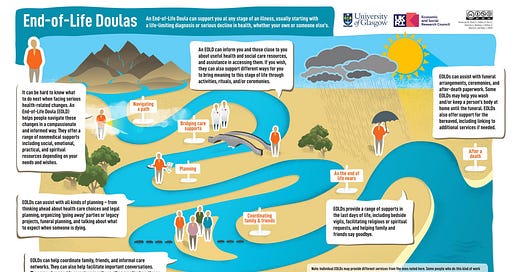What is a death doula?
'Our ultimate goal after all, is not a good death but a good life to the very end'. Atul Gawande, Being Mortal
Death (end of life) doulas help the person dying and their community to navigate the whole end-of-life process, through informed choices and community supported care.
The role of a death doula
This useful map shows the common practices and supports in end-of-life doula care - from diagnosis, bridging care supports, care planning, coordinating family and friends, as the end of life nears, and after a death.
Trained in supportive listening not counselling, they are known as death doulas, soul midwives or a ‘friend in death’ (‘amicus mortis’).
You might have heard of a birth doula that supports someone at the beginning of life with the birthing process. Both birth and death doulas are there to help take the fear out of these great gateways, with death doulas supporting the person to make informed choices based on their wishes right until the very end.
“Framing death as a failure is a barrier to good quality end-of-life care."
Emma, Director, End of Life Doula UK
Dying is often seen as a failure of medical treatment by our western medicalised culture. So, choosing quality of life over quantity of life can be seen as counter cultural. A need for intimacy at the end-of-life can get lost as conversations about medical treatment dominate.
See end-of-life support for examples of what support I can provide as your death doula.
How a death doula works
Death doulas can support someone for any amount of time and at any stage of illness, and can continue to support the family and friends after the death. Working in people’s homes or care homes, in hospitals and hospices, death doulas collaborate with medical and care teams, facilitating joined-up care within the village of the dying person, to achieve positive patient outcomes.
The doula gets to know the dying person, to help them express their needs (practical, emotional, physical or spiritual)., working with both the mundane and the mysterious. And the role can be different for each person, as the death doula will adapt to the specific needs of the person.
The death doula works with the dying person to ensure they know their choices, and can make informed decisions about them. Avoiding conversations about death and dying is self-defeating, as research shows that planning for these liminal spaces and transitions can help us to regain a sense of control in the face of uncertainty.
The focus is on providing holistic and personalised support to individuals and those important to them during the emotional and spiritual aspects of dying. This kind of support can help you navigate challenging and often emotionally intense time with greater understanding, comfort and dignity.
Community supported care
‘Dying is not an act you can easily undertake yourself. If being born amid those who will love you is the first best hope of life, dying within a community is the last.’
Kevin Toolis
Death doulas facilitate conversations about what the person wants at the end-of-life, and support communication with others in their community (their families, friends and caring circle) to be able to advocate for them.
We’re not instead of the medical professionals - we’re part of the whole integrated team. We know that on average, terminally ill people spend 5% of their time with medical professionals. Death doulas act as a bridge to other care providers, and have more space than medical professionals have.
What death doulas don’t do
We cannot support assisted dying. Currently, assisted dying is an illegal act and The End-of-Life Doula UK Code of Practice, that I’m bound by as a member, means we cannot engage in any illegal act.
If you want to consider voluntarily stopping eating and drinking (VSED), we can support but only in close collaboration with your GP. Read Compassion in Dying’s report on Voluntarily stopping eating and drinking (VSED) - a call for guidance for more information.




